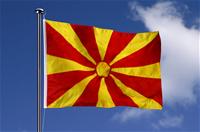The Macedonian parliament was left without opposition
Evelyna topalova, January 31, 2011
 Macedonia entered a parliamentary crisis after lawmakers from almost all opposition parties walked out of the parliament. The main opposition party SDSM, supported by three other parties, announced on January 28th it would no longer take part in the parliament's work.
Macedonia entered a parliamentary crisis after lawmakers from almost all opposition parties walked out of the parliament. The main opposition party SDSM, supported by three other parties, announced on January 28th it would no longer take part in the parliament's work.
The reason for their move was the prosecution office's decision to block the bank accounts of the private A1 TV, known for its criticism for the government, and of the dailies Vreme, Spic and Koha E Re. They are among 11 companies whose executives are under investigation for tax evasion.
The whole saga related to A1 started on November 25th. Back then the private media was blocked by tax inspectors and police officers that, according to the official statement, were investigating companies registered at the same address on suspicion of tax frauds. The general prosecutor's office said that the TV channel was not the subject of the investigation.
A month later, A1 owner Velija Ramkovski was detained along with several other businessmen on suspicion of tax evasion and money laundering, while several days ago the bank accounts of his media were blocked. Prosecutor Ljupco Svrgovski said at a press conference during the weekend that blocking the accounts was a standard procedure aimed at defending the interests of the country.
In a sign of a protest journalists from the TV channel moved organised live broadcasting from in front of the government's building.
SDSM leader and former president Branko Crvenkovski said that his party was leaving the parliament as it could not tolerate "the undemocratic rule" of VMRO-DPMNE anymore and the violation of media freedom. He added he had never been in favour of institutions' boycott since he believed that this was not the way of leading a political battle in a parliamentary democracy. In his words, however, Macedonia is lacking democracy for a long time.
The other three opposition parties - NSDP, the Liberal Party and New Alternative said that the attack against the TV channel and the dailies was a sign that there was no democracy and that the ruling coalition was trying to put media under control.
International representatives in Macedonia criticised the decision of the opposition to walk out of parliament but in the same time voiced concern over media independence. The OSCE mission and the EU delegation in Skopje stated that lawmakers' place was in the parliament as this was the only way to guarantee a political dialogue, which was essential for the European integration of the country.
The SDSM's decision to boycott the parliament's work was followed during the weekend by one more opposition party - the ethnic Albanian New Democracy. The party said it was leaving the parliamentary work not in order to condemn the A1 events, but to protest against cabinet's refusal to take into consideration their objections to the population census law, constitutional amendments and the controversial project Skopje 2014 for transformation of the capital.
The parliament can continue functioning even without the opposition (VMRO-DPMNE and its junior coalition partner have a total of 71 representatives in the 120-seat parliament) but de facto there will be no corrective to the ruling parties, local analysts told A1.
The decision of the opposition comes ahead of the February 9th round of consultations on the Macedonia-Greece name dispute. The row prevented the country from receiving an invitation to join NATO and has been delaying opening of the EU accession talks.
With tension at the political scene rising, some started talking about the possibility of early elections.
What would be the results if a snap vote was held today?
According to a survey by the Pavel Shatev Institute, conducted in January 21-23rd 23.8% of Macedonians would back VMRO-DPMNE, while the SDSM would receive the support of 12 per cent of the respondents.
Most of the respondents, as much as 27.3%, say they would not vote for any of the parties while 42% note that they do not trust any of the politicians. This fact is quite alarming and should ring the bell for local political factors and make them take the situation seriously.
 Bakir Izetbegovic, Andrej Plenkovic | © Council of the EU
Bakir Izetbegovic, Andrej Plenkovic | © Council of the EU Aleksandar Vucic, Recep Tayyip Erdogan | © Serbian Presidency
Aleksandar Vucic, Recep Tayyip Erdogan | © Serbian Presidency Jean-Claude Juncker, Zoran Zaev | © European Commission
Jean-Claude Juncker, Zoran Zaev | © European Commission